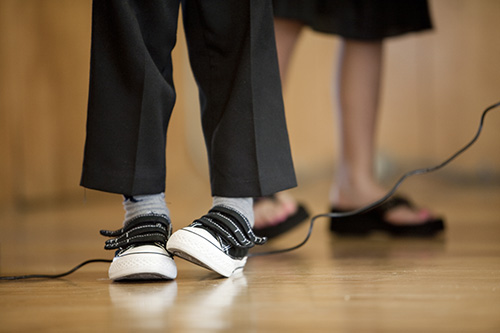Unpopular Opinion
It's time we stop forcing newbie employees to dance during company Christmas parties
The dread, the nerves, the pressure of fitting in—I remember my first Christmas party as a wide-eyed 20-year-old all too well.
I was hired in December of that year, and after a few weeks, I was told new hires in the company had to come up with a performance for the party. As a shy, reserved person, I began planning something I was comfortable doing—maybe grab my sister's ukulele and sing something even though I'm not the best singer. But suddenly, all the other newbies in the company I was working for at the time gathered and said we would just be doing one performance to save time.
The naive, young me shook in my boots because I was most self-conscious about dancing, but it felt like I didn't have a choice. In my mind, I kept telling myself to not be a buzzkill. I didn't want to put the other new hires in a difficult position or disappoint them by not choosing to cooperate. Others kept sharing how this was tradition, and that even my former boss sang and went through the ritual when she was a newbie.
Sure, I could choose to not go to the Christmas party, but this was my first job and I didn't want to be thought of as someone who's "mahirap pakisamahan." So, I grit my teeth and stayed after work hours (unpaid, of course) to practice dancing the most overdone Christmas song, Jingle Bell Rock.
As December rolls around again, more newbies all over the Philippines are forced to get in front of their peers to shake their bodies to overplayed Christmas tunes. While it may be fun for some, others dread it—so maybe it's time we stop making this humiliating performance a yearly thing?

Cut the peer pressure
People in a new environment are prone to peer pressure as there is a push to be liked or fit in, according to Verywell Family, which is backed by a team of board-certified physicians as well recognized health and wellness experts. While this isn't always negative because it can encourage others to try new things or step out of their comfort zone, it can be bad when it causes harm to an individual.
But when name-calling is involved, like being called a "killjoy" or "maarte" just for not wanting to participate, it kind of borders on bullying and may cause damage to a person's sense of well-being and prompt internal criticism.

In addition, some people have anxieties when it comes to performing, and it's not their choice if they freeze or have a panic attack when they're onstage.
Should new hire traditions be broken?
Practicing for performances for the Christmas party takes a lot of extra time beyond work hours and some even shell out money out of their own pockets for costumes. Not everybody has the luxury to spend more time at work as others have families to go back to and chores to do.
One person asked Atty. Chel Diokno if they can file a complaint against their employer for forcing them to dance at a Christmas party. "Depende sa song," the human rights lawyer said jokingly on Twitter.
Unfortunately, it seems like there's nothing you can do unless you stand your ground.
While some people online argue that those who are against Christmas party performances have the choice to not attend the event altogether, it's not that simple or easy.
Of course, some people want to be in goodwill with their employers and co-workers so they bite their tongue and participate. Others are afraid of what their fellow employees will say about them if they don't join in on the supposed "fun." At the end of the day, there's no fun when something is forced.


